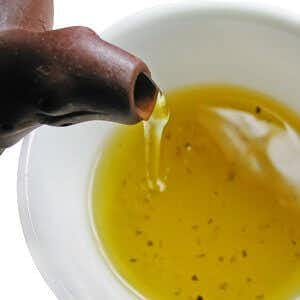
Psoriasis is an often uncomfortable condition in which the immune system attacks the skin. As cells turn over more quickly, they may stack up on the skin as itchy silvery plaques over tender reddish areas of skin. It is little wonder that people with this unsightly condition frequently search for natural ways of overcoming psoriasis. Fortunately, some readers have found that green tea can be surprisingly helpful.
Overcoming Psoriasis with Green Tea:
Q. I started drinking organic sencha green tea to reduce the inflammation causing my arthritis pain. To my surprise, drinking three cups a day cleared up 90 percent of my psoriasis. I love the taste. When I told my dermatologist about this, he said drug companies are now experimenting with the compounds in green tea to make a medicine for psoriasis.
A. “Sencha” is the term for Japanese green tea made without grinding the leaves into powder, as is typical for “matcha” green tea. Green tea is rich in polyphenol compounds, and a study in mice found that these can reduce psoriasis-like skin lesions in mice (Experimental Dermatology, Aug., 2007). The researchers suggest that this could be a fruitful area for further research on overcoming psoriasis, as your dermatologist suggested.
Green Tea Triumphed Over Guttate Psoriasis:
Q. In 2014, my husband was diagnosed with guttate psoriasis, peeling from scalp to feet. After topicals failed, he began drinking three cups of green tea per day. Nothing exotic, just supermarket brands.
In two weeks, the psoriasis was gone. We continue to drink green tea throughout the week, and the condition has never returned.
A. Not all dermatologists know enough about this remedy to recommend it. However, Chinese scientists studied the effectiveness of L-theanine, a compound found in green tea, to treat psoriasis symptoms (Frontiers in Pharmacology, July 26, 2021).
To conduct their study, they induced a psoriasis-like condition in mice with a drug called imiquimod. Then they compared topical L-theanine to placebo and identified a number of inflammatory pathways affected by L-theanine. When applied to the lesions, L-theanine helped the skin heal.
EGCG for Overcoming Psoriasis:
Other researchers focused on the green tea ingredient EGCG (epigallocatechin-3-gallate) (Phytotherapy Research, Sep. 2020). It too shows promise when applied topically to psoriasis.
An earlier study in mice treated so that they would develop psoriasis-like lesions also found that EGCG was helpful in overcoming psoriasis (Zhang et al, BMC Complementary and Alternative Medicine, Aug. 31, 2016). When researchers applied it to the skin, the lesions cleared up. When the mice consumed EGCG, it reduced inflammation and immune system activity in the skin. This leads us to imagine a double-barreled approach to overcoming psoriasis: drinking green tea and soaking the plaques with a green tea solution.
We appreciate your report that drinking green tea could be an effective way to get the benefits of L-theanine or EGCG against psoriasis. Others may also want to try drinking green tea to see if it helps. It is likely to be more accessible and less expensive than any drug developed from the green tea polyphenols. (We have not seen such a medication yet.) If you get some relief from arthritis as well, so much the better!
Learn More:
We offer more information on green tea and our other favorite healing foods in our book, The People’s Pharmacy Quick & Handy Home Remedies, from National Geographic.

